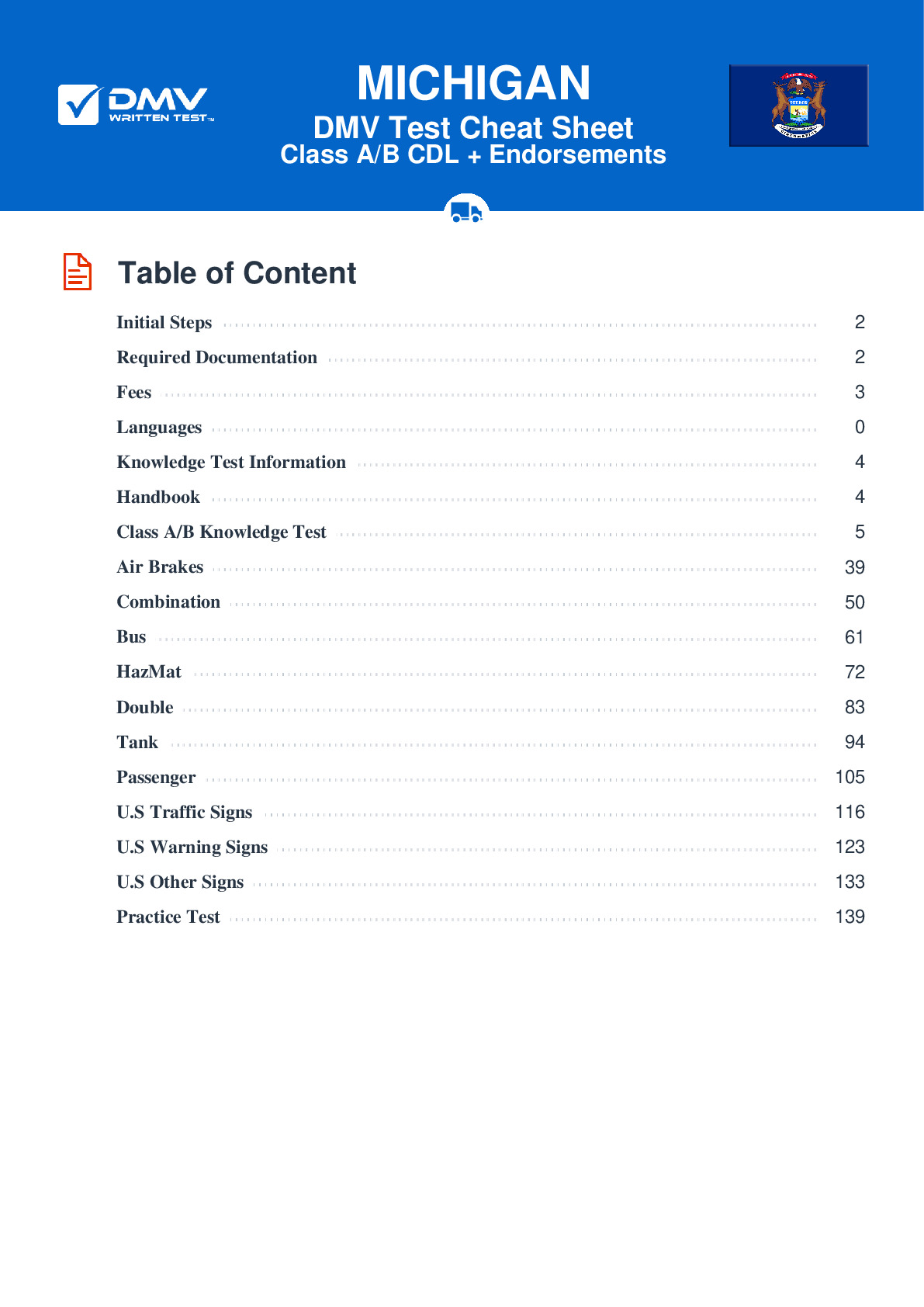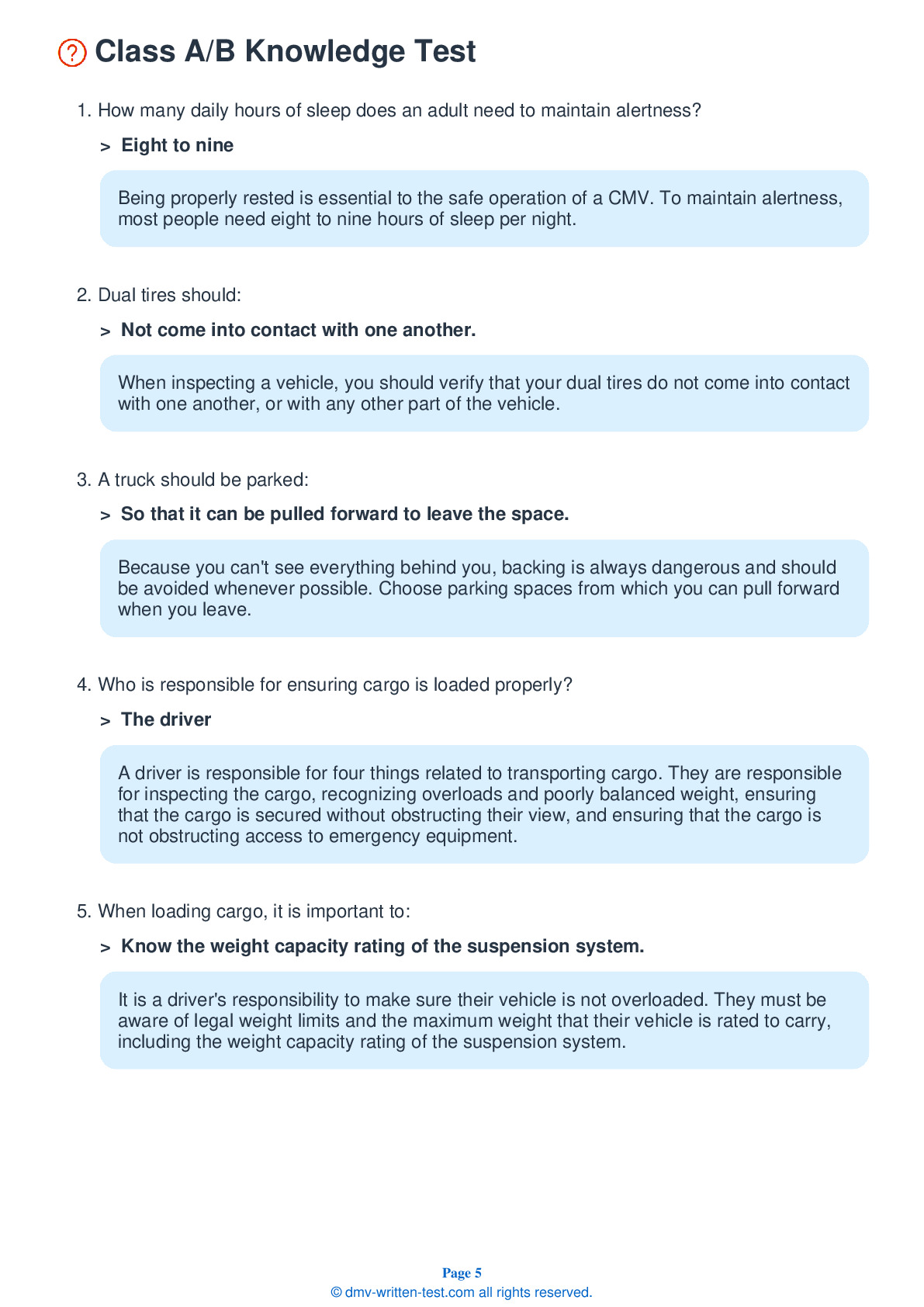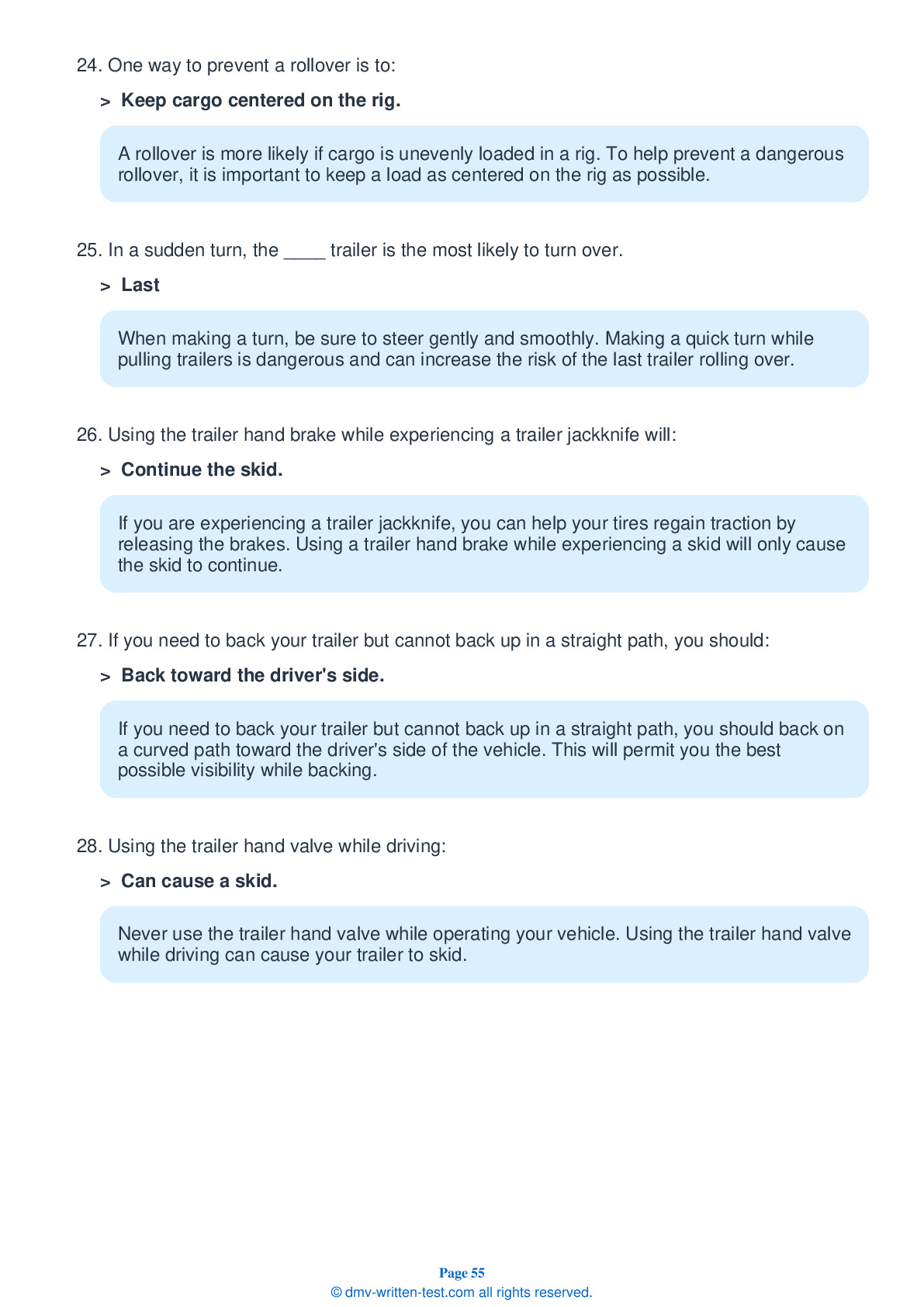Knowledge Test Class B
This license is required for driving a single vehicle with a GVWR of more than 26,001 pounds, and a trailer not to exceed 10,000 pounds gross vehicle weight rating, or a vehicle designed to transport 24 or more people (including the driver). To receive this license, applicants must pass a 50-question test. To pass, applicants must answer 40 questions correctly. Each question has four possible answer choices. Test questions come from the Michigan Commercial Driver License Manual. Questions come from chapters covering: Introduction, Driving Safely, Transporting Cargo Safely, Air Brakes (if applicable), Pre-Trip Vehicle Inspection Test, Basic Vehicle Control Skills Test and On-Road Driving.. Endorsements that may be used with a Class B CDL are: Hazardous materials, Tank, Passenger, HazMat and Tank, Air Brakes and School bus.
22. What is reaction distance?
Your vehicle's stopping distance can be calculated by adding together your perception distance, your reaction distance, and your vehicle's braking distance. Reaction distance is the distance traveled between the moment you mentally perceive a hazard and the moment you physically hit the brakes.
23. The two markings on a front brake limiting valve usually read:
Some vehicles with air brake systems manufactured before 1975 have a front brake limiting valve with "normal" and "slippery" settings.
24. When it’s difficult to see, such as at dawn or dusk, a driver can increase their vehicle's visibility by:
When driving at dawn, at dusk, or in inclement weather, you should use your headlights on their low beam setting to increase your visibility.
25. Which of the following is acceptable if found during a pre-trip inspection?
When inspecting your tires, verify that there is at least 4/32 of an inch of tread depth in every major groove on the front tires, and tread depth of at least 2/32 of an inch on the other tires. Tires on the same vehicle should all be the same size.
26. You may be an aggressive driver if you:
Avoid being an aggressive driver by being realistic about your travel time, making allowance for delays, maintaining reasonable following distances, and not making hand gestures that could anger another driver.
27. When encountering a railroad crossing during the driving test, you should:
During the on-road driving test, you must not stop, change gears, pass another vehicle, or change lanes while any part of your vehicle is in a railroad crossing.
28. When stopping a manual transmission vehicle, you should:
When stopping, apply gradual pressure to the brake pedal and stop smoothly. If stopping a manual transmission vehicle, push the clutch in when the engine is close to idle.
Frequently Asked Questions
Here are the steps to obtain a Class B CDL license in Michigan:
1. Obtain a commercial learner's permit (CLP) by passing the knowledge test for the specific commercial vehicle you want to operate.
2. Hold the CLP for at least 14 days before taking the skills test.
3. Schedule and pass the skills test, which includes a pre-trip inspection, basic controls test, and road test.
4. Submit required documents and fees to the Michigan Secretary of State's office to obtain your Class B CDL license.
5. Maintain your CDL by following all state and federal regulations, including completing regular medical exams and complying with any endorsements or restrictions on your license.
It's important to note that additional endorsements may be required for certain types of vehicles or cargo, such as hazardous materials or passenger transport.
1. Straight trucks: Any truck with a single unit, including dump trucks, delivery trucks, and box trucks.
2. Buses: Any single vehicle designed to transport 16 or more passengers, including the driver.
3. Combination vehicles: Any combination of vehicles with a total weight of 26,001 pounds or more, where the towing vehicle has a GVWR of less than 10,000 pounds. An example of this would be a truck towing a trailer.
It's important to note that additional endorsements may be required for certain types of vehicles or cargo, such as hazardous materials or passenger transport. Make sure to check the Michigan CDL manual for specific requirements and restrictions.
1. Be at least 18 years old (21 years old for interstate driving).
2. Have a valid Michigan driver's license.
3. Provide proof of U.S. citizenship or legal presence in the United States.
4. Provide a valid Social Security number.
5. Pass a DOT physical exam and obtain a medical certificate.
6. Obtain a commercial learner's permit (CLP) by passing the knowledge test for the specific commercial vehicle you want to operate.
7. Hold the CLP for at least 14 days before taking the skills test.
8. Schedule and pass the skills test, which includes a pre-trip inspection, basic controls test, and road test.
9. Submit required documents and fees to the Michigan Secretary of State's office to obtain your Class B CDL license.
It's important to note that additional endorsements may be required for certain types of vehicles or cargo, such as hazardous materials or passenger transport. Make sure to check the Michigan CDL manual for specific requirements and restrictions.
1. Passenger endorsement (P): This endorsement is required for drivers who will be operating vehicles designed to transport 16 or more passengers, including the driver.
2. School Bus endorsement (S): This endorsement is required for drivers who will be operating school buses.
3. Tank Vehicle endorsement (N): This endorsement is required for drivers who will be transporting liquids or gases in bulk containers with a capacity of 1,000 gallons or more.
4. Hazardous Materials endorsement (H): This endorsement is required for drivers who will be transporting hazardous materials as defined by the Department of Transportation.
5. Double/Triple Trailer endorsement (T): This endorsement is required for drivers who will be towing double or triple trailers.
It's important to note that obtaining an endorsement requires additional knowledge and skills tests beyond those required for a standard Class B CDL license. Therefore, make sure to check with the Michigan Secretary of State's office or refer to the Michigan CDL manual to determine which endorsements you may need and how to obtain them.
1. Pre-trip inspection: You will be required to perform a thorough inspection of your vehicle to ensure that it is safe to operate. You will need to demonstrate your ability to identify and explain the function of various components of the vehicle, such as brakes, lights, tires, steering, and suspension.
2. Basic vehicle control test: You will be asked to perform several maneuvers in a controlled environment, such as backing up, turning, shifting gears, and stopping. The examiner will assess your ability to safely control the vehicle and follow proper procedures.
3. On-road driving test: You will be required to demonstrate your ability to safely operate the vehicle on public roads. The examiner will give you directions and evaluate your ability to follow traffic laws, make proper lane changes, use mirrors effectively, and communicate with other drivers.
It's important to note that passing the skills test alone is not enough to obtain a Class B CDL license in Michigan. You must also pass a written knowledge test and meet other requirements, such as medical certification and background checks. It's recommended that you study the Michigan CDL manual thoroughly and practice driving with a licensed commercial driver before taking the skills test.
1. Vehicle weight rating: A Class B CDL allows you to operate a single vehicle with a weight rating of 26,001 pounds or more. However, you are not allowed to tow a vehicle with a weight rating of more than 10,000 pounds.
2. Passenger restrictions: If you do not have a passenger endorsement, you are not allowed to operate a vehicle designed to transport more than 16 passengers (including the driver).
3. Hazardous materials: If you do not have a hazardous materials endorsement, you are not allowed to transport hazardous materials as defined by the Department of Transportation.
4. Time restrictions: If you are under 21 years old, you are not allowed to operate a commercial vehicle across state lines or transport hazardous materials.
5. Medical certification: You must have a valid medical certificate that meets the requirements of the Federal Motor Carrier Safety Administration (FMCSA) in order to operate a commercial vehicle.
It's important to note that these restrictions and limitations may vary depending on your specific situation and the type of endorsements you hold. Make sure to check with the Michigan Secretary of State's office or refer to the Michigan CDL manual for more information on Class B CDL restrictions and limitations.
If you choose to take the test in a language other than English, you will need to bring a qualified interpreter with you to the testing location. The interpreter must be at least 18 years old and fluent in both English and your chosen language. They will be required to sign an oath of confidentiality and sit with you during the test.
It's important to note that while taking the written test in your native language can be helpful, it's still important to have a good understanding of English as well. This is because road signs and other traffic signals are typically in English, and you will need to communicate with other drivers and law enforcement officers in English while on the road.
Examples of accommodations that may be available include:
- Extended testing time
- Braille or large-print test materials
- Sign language interpreter or other assistive technology
- Quiet testing environment
To request accommodations for the Class B CDL written test, you will need to complete an Accommodation Request Form and submit it to the Michigan Secretary of State's office at least 30 days before your scheduled test date. The form requires documentation from a qualified professional (such as a doctor or psychologist) that verifies your disability and explains the specific accommodations you need.
It's important to note that the Michigan Secretary of State's office will make every effort to provide reasonable accommodations, but not all requests may be granted. If you have any questions about the accommodation request process, you can contact the Michigan Secretary of State's Office of Services to the Blind and Visually Impaired at 1-800-292-4200.
If you fail the written test, you will be given a report that shows which questions you answered incorrectly. This can be helpful in identifying areas where you need to improve your knowledge before taking the test again. You will also be required to wait at least one business day before retaking the test.
It's important to note that if you fail the written test three times, you will need to wait at least two weeks before taking it again. Additionally, if you fail the same test three times, you will be required to retake a driver education course before being allowed to take the test again.
To prepare for the written test, it's recommended that you study the Michigan Commercial Driver License Manual, which is available online or at any Michigan Secretary of State branch office. You can also take practice tests online or through commercial driving schools to help prepare for the actual exam.




